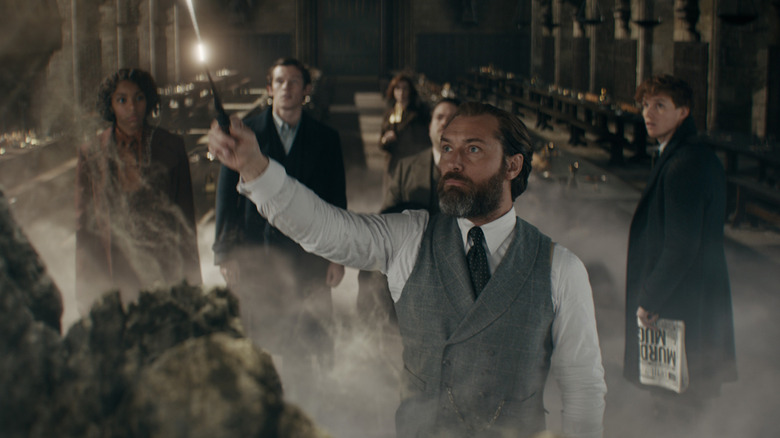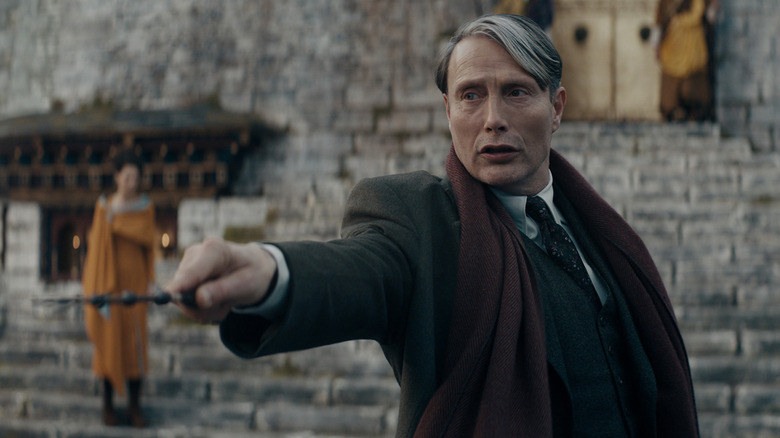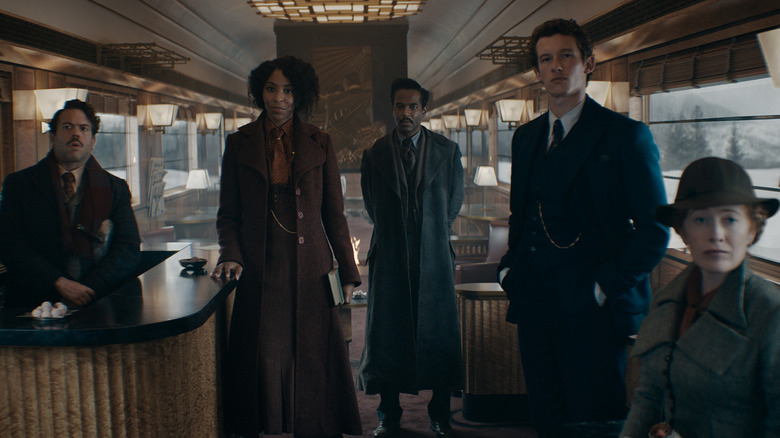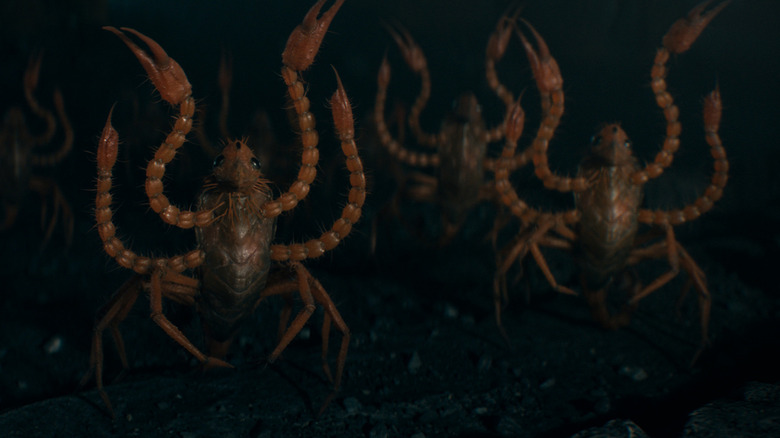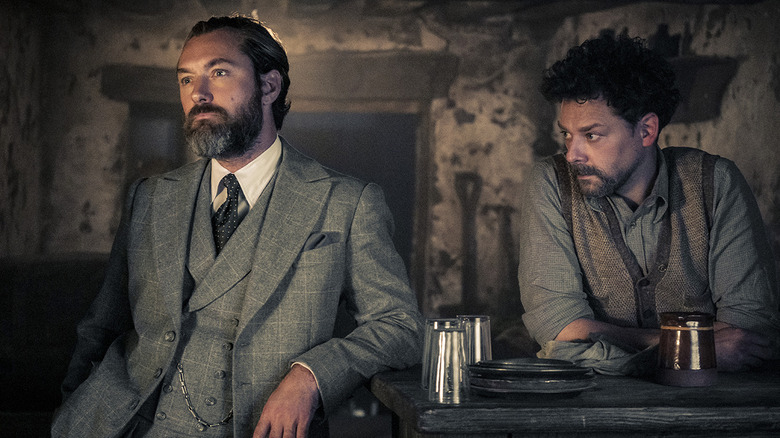Fantastic Beasts: The Secrets Of Dumbledore Review: The Best Spin-Off Chapter Yet, But It's Still Missing Magic
J.K Rowling hasn't exactly been doing the wizarding world of "Harry Potter" any favors lately. On top of her heinous and ongoing comments about the transgender community that have rubbed her diverse fanbase the wrong way, she's also been dulling the legacy of the magical film franchise with the mostly lackluster spin-off series "Fantastic Beasts and Where to Find Them." This prequel saga hit an all-time low, both critically and financially, with the second installment in the series, "Fantastic Beasts: The Crimes of Grindelwald." But with five films planned since the inception of the "Fantastic Beasts" series, the magic show must go on.
"Fantastic Beasts: The Secrets of Dumbledore" (in theaters in the United States on April 15, 2022) continues the story of magizoologist Newt Scamander (Eddie Redmayne) as his passionate studies of magical creatures become invaluably embroiled in the wizarding world's struggle against the dark wizard Gellert Grindelwald (first portrayed by Johnny Depp, but now played by "Casino Royale" and "Doctor Strange" villain Mads Mikkelsen). However, just as "The Crimes of Grindelwald" focused less on Mr. Scamander and more on an ensemble of characters caught up in this magical battle of good and evil, "The Secrets of Dumbledore" is even more concerned with the bigger picture while still keeping the creature caretaker as the heart of the film series. The result is a movie that mixes the vibe of a 1930s war drama with a magic-infused "Mission: Impossible"-esque plot and wholly relevant, contemporary themes to deliver the most satisfying and exciting chapter in the "Fantastic Beasts" franchise yet. However, where "The Secrets of Dumbledore" still falls short is in telling a story that not only feels as carefully plotted as the preceding "Harry Potter" films but also commands attention.
The secret is out
"The Secrets of Dumbledore" wastes no time wading into one of the Hogwarts professor's biggest secrets, which has been presumed by fans ever since the character's history with Grindelwald was touched upon in the "Harry Potter" books. The blood oath between Grindelwald and Dumbledore (Jude Law) that keeps them from fighting each other didn't come about only because the two had grand but naive ambitions about changing the world, or even because they bonded as brothers. Dumbledore stood by Grindelwald's side because he loved him deeply, making the dark wizard's path towards wizard supremacy over Muggle-kind that much more painful for the man who has always strived to do what is right instead of what is easy.
Dumbledore's affirmation of his love for Grindelwald comes out in the opening scene as the two chat in an upscale restaurant before it suddenly goes up in flames. While never clearly explained, it would seem this meeting of the two minds unfolded on a sort of magical plane of existence rather than a real-world location, almost as if it were a sort of magical hologram. I only say this because Dumbledore seems fairly unconcerned with the rest of the patrons in the establishment. This lack of clarification is one of several instances where the expansion of various magical concepts and world-building elements are left mostly unexplained, unlike new details about the wizarding world that were properly introduced throughout the "Harry Potter" franchise.
Meanwhile, we find Newt Scamander in the bamboo jungles of China where he's helping a scaly, deer-like creature give birth to a youngling. Resembling an antelope mixed with a mythical dragon, the creature is a Qilin (pronounced chillin), one of many brought to life with impeccable visual effects done so well that even the physical interaction between actors and CGI creations doesn't look phony. It's just a shame some of the environments don't look as good, revealing far too much digital work rather than real locations, including two signature Hogwarts spots that return in this movie. Plus, the color palette continues to be endlessly dreary. Even though that feels reflective of the time in which the story takes place and allows for the color of creatures to pop, it makes the whole film feel like quite the muted affair.
The birth of the Qilin is quickly interrupted when Credence (Ezra Miller), the Obscurial lured into following Grindelwald and revealed to be an estranged member of the Dumbledore family, shows up with two fellow dark wizards. The trio quickly attacks the adult Qilin, sending Newt and the baby scrambling down a grassy hillside in a desperate escape for their lives. Thrown for a loop by the confrontation and sudden fall, Newt is left disoriented in the jungle, and the dark wizards are able to snatch the young Qilin. But it's not a total loss, because when Newt makes his way back up the hill, even though the adult Qilin takes its last breath, he discovers that it actually had twins, leaving Newt with a healthy baby that he can care for. This creature acts as the film's MacGuffin, and the multiple functions it serves feel a little too convenient.
I love it when a plan comes together
But the Qilin isn't just another magical creature that Newt intends to study. Instead, he's retrieved this creature at the request of Dumbledore. Why? Well, that's not made entirely clear at first. However, we do see what Grindelwald wanted the Qilin for early on: when the blood of this creature is spilled, it allows Grindelwald to see into the future, making it supremely difficult to make a move against him. Therefore, Dumbledore intends to employ what he refers to as "countersight," by hatching a plan that has so many moving parts that it makes it difficult for Grindelwald to see the truth. That might sound like a poor excuse for the film having a convoluted plot (and maybe it is), but it actually results in a fairly intriguing storyline that always keeps you guessing, because no one member of Dumbledore's makeshift team knows the entire plan, and some of them may not be so trustworthy. It makes Dumbledore's penchant for secretly pulling strings and putting others at risk much more acceptable this time around.
The team in question is comprised of a variety of characters you've seen before. Obviously, Newt Scamander is back, this time more willingly. He might even be a little keener now because he's able to work with Eulalie "Lally" Hicks (Jessica Williams), a Charms professor from the American wizarding school Ilvermorny who has corresponded with Newt by letter several times and had a brief but key appearance in "The Crimes of Grindelwald." Hicks is tasked with convincing the Muggle baker Jacob Kowalski (Dan Fogler) to join them, despite his jaded and heartbroken feelings after his sweetheart witch Queenie (Alison Sudol) chose to follow Grindelwald. Kowalski finds newfound confidence and enthusiasm by being given a wand at the behest of Dumbledore, which makes for some solid comedic bits. Then we also have Newt's brother Theseus (Callum Turner), his assistant caretaker Bunty (Victoria Yeates), and Yusuf Kama (William Nadylam), half-brother of the late Leta Lestrange (Zoe Kravitz), who perished in the second movie. They're quite a ragtag team, and none of them are entirely sure of how Dumbledore intends to move against Grindelwald, but they all trust him implicitly and carry out the tasks they've been given, keeping details from one another in the process.
What follows is a combination of rousing setpieces and somewhat confusing world-building that unfolds against the backdrop of the imminent election of a new President of the International Confederation of Wizards, a position that seems to be an overarching government official who oversees the Ministers of Magic in their respective countries. This is never fully explained, and only keys you into information as the story goes on, such as the introduction of two candidates: China's Liu Tao (Dave Wong) and Brazil's Vicência Santos (Maria Fernanda Cândido). However, the thematic significance is clear, because it draws a not-so-subtle connection to the election of leaders such as Donald Trump in the United States or Boris Johnson in the United Kingdom, unqualified individuals who appealed to a certain demographic with bombastic language and a facade of care for the well-being of misinformed citizens who feel underrepresented. Grindelwald uses this influence and his growing number of followers to not only convince outgoing President Anton Vogel to recuse him of any crimes, but to make him a candidate in the election. Vogel, thinking that there's no way Grindelwald could actually win, grants his request, making the election the crux of a potential chain reaction of events that could throw both the wizarding world and the Muggle world into upheaval. Though wholly relevant to our trying social and political climate, this doesn't seem to add anything to the story that wasn't already present in the original "Harry Potter" franchise, one of several things that make these spin-offs feel extraneous and unnecessary.
Fantastic beasts, not-so-fantastic world-building
"Fantastic Beasts: The Secrets of Dumbledore" is at its best when it mixes the magical elements of the wizarding world with quasi-heist scenarios that have touches of "Ocean's 12" or any of the "Mission: Impossible" movies. The ensemble nature of the cast and the imaginative predicaments in which our team of witches and wizards find themselves both make for plenty of engaging suspense and exhilaration. Sequences range from your standard wizard duels to a delightfully twisted prison break where Newt Scamander must uniquely use his knowledge of magical creatures to keep safe from a deadly pack of manticores, little lobster-scorpion hybrid creatures who are deadly in a swarm, especially when fed by their giant counterpart living deep within the prison. And don't worry, Newt's reliable sidekicks, the lock-picking Bowtruckle named Pickett and the gold-loving Niffler called Teddy, get their time to shine, too.
Not all of the prominent magical sequences feel fully baked though, especially when it comes to the mythology of the wizarding world. For example, when Credence attacks Dumbledore in the middle of a city in order to complete his mission, it appears to be quite a destructive duel that uses huge chunks of buildings as spiraling projectiles, which would no doubt result in a lot of questions from Muggles, who may have even be hurt or killed in such a confrontation. Perhaps knowing that this could bring about comparisons to the devastation caused in the destructive battles between Superman and Zod in "Man of Steel," it's revealed that this battle is actually taking place in a sort of mirrored version of the city where Credence has been tricked into thinking that this is reality. However, the use of this magic is never explained, which calls into question why Dumbledore would have never used this ability later in his life in the "Harry Potter" franchise.
Similarly, the film's final setpiece, which involves the pursuit of a certain magical item that has been duplicated in an effort to put Grindelwald's followers on a wild goose chase, feels like it could easily be dispatched thanks to the use of magic we've seen several times before. On top of that, the location of that setpiece, a mountaintop village in Bhutan where the election is being held, seems to exist simply for the varied spectacle of it all. There's no rhyme or reason ascribed to why the election has to take place there, nor why it's carried out in such a fashion other than for the sake of the film's plot. It's also far too easy for those with no business being at the election to infiltrate it. These might seem like logistical nitpicks, but if the blockbuster spectacle and story aren't enthralling enough to keep you from lingering on those thoughts, then that's a problem, especially when the "Harry Potter" franchise handled details like this so well.
Dumbledore: Dumble-more or Dumble-snore?
"The Secrets of Dumbledore" also succeeds is in the treatment of (most of) its characters. Newt's place in the story feels more justified than ever before, but the movie is also better for not forcing him to carry the movie. The story of Jacob and Queenie remains the most enchanting and satisfying, with Dan Fogler again being the MVP. His performance is charming, genuine, and simply fun. Meanwhile, Jude Law gets much more time to flesh out this younger Albus Dumbledore in a performance that feels like his own but also has influences from Michael Gambon's portrayal of the character.
Unfortunately, not everyone is treated so well. Tina Goldstein (Katherine Waterston) is almost entirely sidelined, and she has no part in the film's plot. Though there's a reason given, it makes for an unsatisfying gap for her character in the overall franchise, especially considering how integral she was in the first two installments. But perhaps the biggest disappointment is Mads Mikkelsen as Grindelwald. It's not because Mikkelsen's performance isn't good, but rather because the script doesn't give him much to do. That's partially because, like Dumbledore, he has to pull strings instead of making moves himself (due to the blood oath). But even the scenes that reveal his villainy are understated and don't make Grindelwald feel all that menacing, no matter how piercing Mikkelsen's gaze can be. Even if that's intentional, it still makes for a disappointing antagonist.
But despite the shortcomings of "The Secrets of Dumbledore," this is easily the most entertaining of the "Fantastic Beasts" franchise so far. It feels the most like a "Harry Potter" movie, which is likely thanks to the fact that J.K. Rowling didn't write this screenplay on her own — "Harry Potter" franchise writer Steve Kloves co-wrote the film with her. In fact, it seems like so much rewriting was done that an additional credit was required, indicating the movie was "based on a screenplay written by J.K. Rowling." Considering the missteps of the first two movies, which feel like a result of Rowling being better suited for writing novels than screenplays (she really should have written these stories as books first), "The Secrets of Dumbledore" has the most competent story yet, even if it's missing some crucial details to properly flesh out new elements of the wizarding world.
In the end, this franchise is still missing the magic that made that original series feel so creatively complete and satisfying. Though "Fantastic Beasts" has become a little more crucial by tying into the history of Albus Dumbledore — which includes fleshing out the story of his brother Aberforth (played by Richard Coyle here), their late sister Ariana, and the estranged Aurelius (aka Credence) — even that doesn't feel like it comes to a satisfying enough conclusion to be an integral part of the overall wizarding world. With two more installments of the "Fantastic Beasts" franchise supposedly in the works, "The Secrets of Dumbledore" may save the franchise just enough to keep fans engaged. But the promise of a wizarding war between Dumbledore and Grindelwald in a magical fight between good and evil simply doesn't seem as enticing or engaging as the story of The Boy Who Lived and You-Know-Who.
/Film Rating: 6 out of 10
